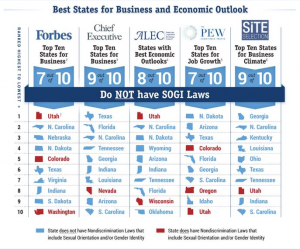News media outlets have been promoting recently introduced HB 2586, a bill that would add sexual orientation and gender identity to Arizona’s nondiscrimination laws. Current law prohibits discrimination in employment, housing, and public accommodations because of a person’s race, color, religion, sex, age, disability, familial status or national origin. HB 2586 adds sexual orientation and gender identity (SOGI) to these protected classes.
Center for Arizona Policy does not support HB 2586. Following are some of our reasons:
- Arizona is Tolerant and Fair-Minded:
These types of laws are solutions in search of a problem. The citizens of Arizona, like most Americans, do not refuse to hire, serve, or rent to people simply because they identify as gay or lesbian or because of their gender identity. This is not only because the people of Arizona are tolerant and fair-minded, but also because the free market, through boycotts and public pressure, would swiftly impose substantial social costs on anyone engaged in baseless discrimination.
- Economic Growth is Not Dependent on SOGI Laws:
Advocates of SOGI laws like HB 2586 argue that they are needed because they are good for business. However, in Arizona, we see repeated announcements of new businesses moving to Arizona because of our favorable business climate. The lack of a statewide law is not impeding growth. Further, the chart below showing the business outlook and economic growth of states that do not have such laws for 2017 prove that they are not needed for economic growth.
- Threatens Freedom to Live and Work According to One’s Convictions:
Every person should be free to live and work according to his or her convictions. However, SOGI laws have imperiled First Amendment freedoms by requiring citizens to act contrary to their religious beliefs or convictions regarding marriage and human sexuality. If those citizens choose to act consistently with their conscience, the government subjects them to fines, penalties, and, in some jurisdictions, jail time.
Small-business owners that serve all people, yet cannot celebrate all events or communicate all messages, have been harmed by SOGI laws:
- Elaine Huguenin from New Mexico had to close her photography business because the state was compelling her to photograph same-sex weddings. The New Mexico Supreme Court ruled against Elaine, with the U.S. Supreme Court declining to consider the case on appeal.
- Jack Phillips from Colorado was forced to give up 40% of his cake design business because the state was compelling him to create custom wedding cakes for same-sex weddings. Whether the state will succeed in denying Jack the freedom to live and work according to his faith is now before the U.S. Supreme Court in the Masterpiece Cakeshop litigation.
- Barronelle Stutzman from Washington is at risk of losing her business and all her personal assets because she could not, in good conscience, use her artistic talent to create flower arrangements for a same-sex wedding. Yet, Barronelle had served the same-sex couple for years, never discriminating against them because of their sexual orientation. She could not participate in an event –a wedding –because of her conscience.
- Two artists in Phoenix potentially face fines and jail time under Phoenix’s SOGI law if they decline to create custom wedding invitations for same-sex weddings. Their case is on appeal before the Arizona Court of Appeals.
- Harms Small Businesses:
These laws threaten small-business owners with devastating financial liability for actions based not on objective traits, but on subjective and unverifiable identities. The concept of gender identity, in particular, is so fluid and ill-defined that even its proponents admit that it may vary by time and place for a particular person. Due to their vague language, broad reach, and inclusion of unverifiable traits, these laws may be used to punish small-business owners even when they do not intend, or even know, that they are acting in violation of the law—indeed, even if they are trying to prevent men who identify as women from entering women’s bathrooms.
- Creates Privacy and Safety Concerns in Bathrooms and Locker Rooms:
These laws require that sex-specific facilities, like bathrooms and locker rooms, must admit individuals in accordance with their chosen gender identity. This means that men who profess a female identity must be permitted to access women’s bathrooms and locker rooms. A women’s shelter for victims of domestic violence could be forced to provide shelter for a man alleging a female identity. This clearly raises privacy and safety concerns. Studies have shown that sexual predators will take advantage of laws that grant them easier access to their victims.
- Denies Churches and Religious Institutions First Amendment Freedoms:
Some proponents allege that policy proposals like HB 2586 provide exceptions for religious institutions. However, these laws have been used to compel faith-based institutions to choose between providing necessary services or following state mandates. In Boston, Catholic Charities ceased its adoptions services rather than follow the law’s mandate to place children in same-sex households.
ICYMI – Latest News & Articles of Interest
- Keep up-to-date on CAP-supported bills on CAP’s bill tracker.
- On Monday, CAP-supported bill HB 2563 Campus Free Speech passed House Education committee with an 8-3 vote. This bill strengthens free speech rights of college students at public universities and community colleges.
- On Wednesday, CAP-supported bill SB 1394 Abortion Reporting passed Senate Health & Human Services committee with a 5-2 vote. This bill enhances existing abortion reporting laws so that Arizona policymakers will have better data. Good policy requires good data.
- On Thursday, the Arizona House of Representatives passed two CAP-supported bills, HB 2460 School Sale Equity (Vote: 34-23-3) and HB 2461 School Zoning Equity (Vote: 34-23-3).
- Read about the candidates for Congressional District 8 Special Election at azvoterguide.com.

